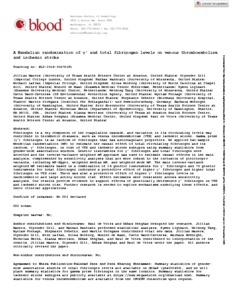Maners, J;
Gill, D;
Pankratz, N;
Laffan, MA;
Wolberg, AS;
de Maat, MPM;
Ligthart, S;
Tang, W;
Ward-Caviness, CK;
Fornage, M;
et al.
Maners, J; Gill, D; Pankratz, N; Laffan, MA; Wolberg, AS; de Maat, MPM; Ligthart, S; Tang, W; Ward-Caviness, CK; Fornage, M; Debette, S; Dichgans, M; McKnight, B; Boerwinkle, E; CHARGE Inflammation Working Group; INVENT Consortium; MEGASTROKE consortium of the International Stroke Genetics Conso; Smith, NL; Morrison, AC; Dehghan, A; de Vries, PS
(2020)
A Mendelian randomization of γ' and total fibrinogen levels in relation to venous thromboembolism and ischemic stroke.
Blood, 136 (26).
pp. 3062-3069.
ISSN 1528-0020
https://doi.org/10.1182/blood.2019004781
SGUL Authors: Gill, Dipender Preet Singh
![[img]](https://openaccess.sgul.ac.uk/112782/1.hassmallThumbnailVersion/blood.2019004781.pdf)  Preview |
|
PDF
Accepted Version
Available under License ["licenses_description_publisher" not defined].
Download (722kB)
| Preview
|
Abstract
Fibrinogen is a key component of the coagulation cascade, and variation in its circulating levels may contribute to thrombotic diseases, such as venous thromboembolism (VTE) and ischemic stroke. Gamma prime (γ') fibrinogen is an isoform of fibrinogen that has anticoagulant properties. We applied 2-sample Mendelian randomization (MR) to estimate the causal effect of total circulating fibrinogen and its isoform, γ' fibrinogen, on risk of VTE and ischemic stroke subtypes using summary statistics from genome-wide association studies. Genetic instruments for γ' fibrinogen and total fibrinogen were selected, and the inverse-variance weighted MR approach was used to estimate causal effects in the main analysis, complemented by sensitivity analyses that are more robust to the inclusion of pleiotropic variants, including MR-Egger, weighted median MR, and weighted mode MR. The main inverse-variance weighted MR estimates based on a combination of 16 genetic instruments for γ' fibrinogen and 75 genetic instruments for total fibrinogen indicated a protective effect of higher γ' fibrinogen and higher total fibrinogen on VTE risk. There was also a protective effect of higher γ' fibrinogen levels on cardioembolic and large artery stroke risk. Effect estimates were consistent across sensitivity analyses. Our results provide evidence to support effects of genetically determined γ' fibrinogen on VTE and ischemic stroke risk. Further research is needed to explore mechanisms underlying these effects and their clinical applications.
| Item Type: |
Article
|
| Additional Information: |
This research was originally published in Blood. Maners, J; Gill, D; Pankratz, N; Laffan, MA; Wolberg, AS; de Maat, MPM; Ligthart, S; Tang, W; Ward-Caviness, CK; Fornage, M; et al. A Mendelian randomization of γ' and total fibrinogen levels in relation to venous thromboembolism and ischemic stroke. Blood. 2020; 136:3062-3069. © the American Society of Hematology. |
| Keywords: |
CHARGE Inflammation Working Group, INVENT Consortium, MEGASTROKE consortium of the International Stroke Genetics Consortium (ISGC), 1102 Cardiorespiratory Medicine and Haematology, 1103 Clinical Sciences, 1114 Paediatrics and Reproductive Medicine, Immunology |
| SGUL Research Institute / Research Centre: |
Academic Structure > Infection and Immunity Research Institute (INII) |
| Journal or Publication Title: |
Blood |
| ISSN: |
1528-0020 |
| Language: |
eng |
| Publisher License: |
Publisher's own licence |
| Projects: |
| Project ID | Funder | Funder ID |
|---|
| R01HL141291 | National Heart, Lung, and Blood Institute | http://dx.doi.org/10.13039/100000050 | | R01HL139553 | National Heart, Lung, and Blood Institute | http://dx.doi.org/10.13039/100000050 | | 18CDA34110116 | American Heart Association | http://dx.doi.org/10.13039/100000968 | | 203928/Z/16/Z | Wellcome Trust | http://dx.doi.org/10.13039/100004440 | | R01HL59367 | National Heart, Lung, and Blood Institute | http://dx.doi.org/10.13039/100000050 | | RE/18/4/34215 | British Heart Foundation | http://dx.doi.org/10.13039/501100000274 | | R01HL134894 | National Heart, Lung, and Blood Institute | http://dx.doi.org/10.13039/100000050 | | R01HL105756 | National Heart, Lung, and Blood Institute | http://dx.doi.org/10.13039/100000050 | | HHSN268201700001I | National Heart, Lung, and Blood Institute | http://dx.doi.org/10.13039/100000050 | | HHSN268201700002I | National Heart, Lung, and Blood Institute | http://dx.doi.org/10.13039/100000050 | | HHSN268201700003I | National Heart, Lung, and Blood Institute | http://dx.doi.org/10.13039/100000050 | | HHSN268201700004I | National Heart, Lung, and Blood Institute | http://dx.doi.org/10.13039/100000050 | | HHSN268201700005I | National Heart, Lung, and Blood Institute | http://dx.doi.org/10.13039/100000050 | | R01HL087641 | National Institutes of Health | http://dx.doi.org/10.13039/100000002 | | R01HL059367 | National Institutes of Health | http://dx.doi.org/10.13039/100000002 | | R01HL086694 | National Institutes of Health | http://dx.doi.org/10.13039/100000002 | | U01HG004402 | National Human Genome Research Institute | http://dx.doi.org/10.13039/100000051 | | HHSN268200625226C | National Institutes of Health | http://dx.doi.org/10.13039/100000002 | | UL1RR025005 | National Institutes of Health | http://dx.doi.org/10.13039/100000002 | | R01HL59367 | National Heart, Lung, and Blood Institute | http://dx.doi.org/10.13039/100000050 |
|
| PubMed ID: |
33367543 |
| Dates: |
| Date |
Event |
| 2020-12-24 |
Published |
| 2020-07-28 |
Published Online |
| 2020-07-12 |
Accepted |
|
 |
Go to PubMed abstract |
| URI: |
https://openaccess.sgul.ac.uk/id/eprint/112782 |
| Publisher's version: |
https://doi.org/10.1182/blood.2019004781 |
Statistics
Item downloaded times since 14 Jan 2021.
Actions (login required)
 |
Edit Item |



